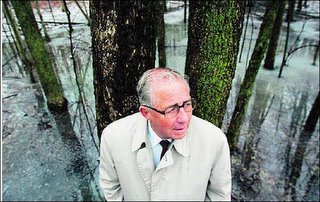Property Rights

Keith Carabell stands on his land in Chesterfield Township. Sixteen of his 19.6 acres have been classified as wetlands. Federal regulators prohibited him from filling the land, even though he received a permit from a Michigan administrative law judge.
Photo Copyright 2006 ERIC SEALS/Detroit Free Press
The U.S. Supreme Court is hearing two property rights cases from Michigan. The rulings will impact millions of acres of federally-designated "wet land," even if these pieces of land are no where near actual streams, rivers, lakes or other bodies of water.
It also pits the property-rights crowd against the environmental/conservation crowd.
The rulings won't impact two pieces of property in Michigan - they will impact every property owner who wants to do something with his or her property.
The Supreme Court must answer this question: can the federal government restrict development on isolated wetlands not adjacent to navigable streams and lakes to protect water quality?
The Government says "yes." The Clean Water Act allows it to protect isolated wetlands, drainage ditches and tiny streams because of their impact on the health of larger lakes and rivers.
The Property rights crowd says "NO!" The Clean Water Act only regulates navigable waters and wetlands adjacent to them. Applying this Act any other way is effectively a confiscation of private property.
Tags: Property Rights , Environmentalism , Conservation , Supreme Court





|